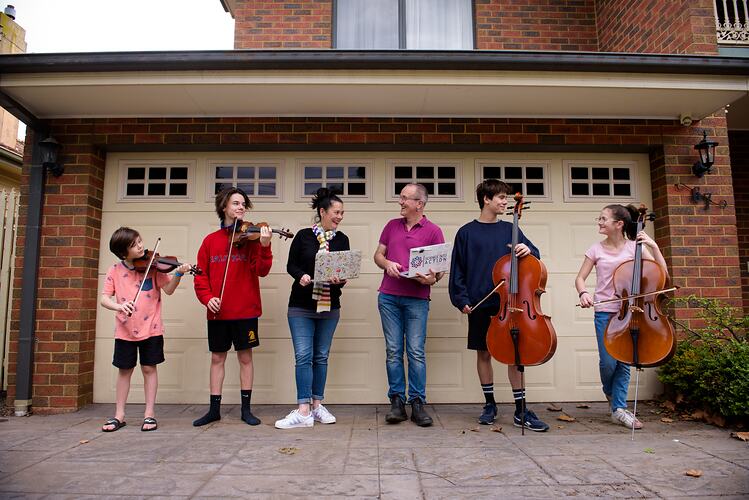Summary
This digital photograph depicts family members Anthony Boxshall, Sonya Mulholland, Oscar Mulhall, Magnus Mulhall, Scarlett Mulhall and Phineas Mulhall during the State of Victoria's first COVID-19 lockdowns and associated 'stay at home' restrictions. The family are pictured standing in front of their garage, posing with musical instruments.
Parents Sonya Mulholland, a secondary school teacher, and Anthony Boxshall, a science impact professional, reflected in August 2020 that 'COVID-19 slowed our family down completely. Prior to lockdown, we had a very hectic family schedule, but when lockdowns came into effect, everything stopped.' With work, school and co-curricular activities grinding to a halt, the family found themselves with a lot more free time: 'We suddenly had the opportunity to dial everything back and go back to the simple things', reflected Sonya, 'and we now had all the time in the world to do music practice.'
Music was an important means through which this family, particularly the four children, coped with the challenges of lockdown. Phineas, aged 10, reflected in September 2020 that 'music has really helped me in quarantine and I have a lot more time to focus on it and learn new things.' Scarlett, aged 13, reflected 'we've had a lot more time to practice our instruments and we were lucky enough to be able to still do our music lessons online.' Magnus, aged 16, reflected that 'music, throughout these housebound times, has almost been like a key to the hefty chains of lockdown. It has allowed me to express myself emotionally in a constructive and meaningful way and explore worlds beyond the confining four walls of my bedroom.' Magnus, along with several classmates at Melbourne High School, composed and performed an interpretation of Israel Kamakawiwo?ole's Somewhere Over the Rainbow, recorded in isolation over Zoom. 'Through singing as a cohort, music ultimately bridged the social isolation that many of us were feeling', he reflected.
Oscar, aged 18, found that music provided a vehicle for him to communicate with, and lift the spirits of, his grandparents: 'The lockdown had a pretty significant impact on my grandparents and their mental health', reflected Oscar, 'one that was observable when we'd Facetime them every now and again. Our sporadic calls, while giving them a chance to talk with us, didn't really replace those interactions they were missing, as going to the shops was quite risky for the elderly. I soon found that music was an amazing alternative, one that allowed us to really connect and simultaneously provide our grandparents with a bit of entertainment. Every weekend or so, I'd set up my Facetime, and play them pieces that I was currently learning. I play the cello, and have done from a very young age, so hearing me play is something they know and love and something that brought them visible happiness. It gave them something to look forward to every now and again, a mini recital, and a window out of the stressful unknown of COVID-19.'
This photograph was taken by Melbourne-based photographer Julie Ewing as part of her 'Across the Fence' photographic series. This series documents life in Melbourne's Darebin region during the first COVID-19 lockdowns that began in Victoria on 14 March 2020. Julie photographed 120 households and 60 businesses during March to April 2020, and this digital photograph is one of 24 images that were acquired into Museum Victoria's Collecting the Curve Collection. These photographs provide a lasting reminder of how neighbourhoods and households in Melbourne were impacted by the COVID-19 global pandemic, as well as the unique ways through which individuals and communities adapted their lives and found new routines, traditions and ways of supporting one another.
Physical Description
Digital TIFF file
More Information
-
Collection Names
-
Collecting Areas
-
Acquisition Information
Donation from Julie Ewing
-
Acknowledgement
Collected as part of the Museum In My Neighbourhood project with support from the Office of Suburban Development.
-
Place & Date Depicted
Fairfield, Greater Melbourne, Victoria, Australia, 07 May 2020
-
Photographer
-
Format
Digital file
-
Classification
-
Category
-
Discipline
-
Type of item
-
Keywords
Pandemics, Home Fronts, Homes, Families, Suburbs, Front Yards
